#janeway: (is seven leaving?????)
Explore tagged Tumblr posts
Text
Janeway in love with seven is like the most precious thing bc she keeps her emotional self kinda private from everyone on board but then *bam* SEVEN, anything to do with Seven and suddenly she's showing everybody her weakness unintentionally bc she's so deep for this woman she doesn't even realize she's telling the whole ship she's in love with her just by being in sevens court at every turn without any regrets. I love janeway. I love how janeway loves seven. I love how kathryn janeway allows herself to love seven, unequivocally.

#bc why not fall in love with the ex borg drone that stole your heart and became your everything#janeway x seven#j7#oh my feelings#shipping the ship#star trek voyager#my otp: im not leaving without you#captain janeway#seven of nine
118 notes
·
View notes
Text
Every time I watch the cold open of Memorial and B'Elanna tells Tom about how she ASSEMBLED a 50's television set from SCRATCH just to surprise him (there's no reason beyond that - just an incredibly sweet and thoughtful gesture) and replicated popcorn for him to eat while he watches and Tom says "They didn't have remote controls in the 50's ♥ Also where's my beer?" I contemplate murder ESPECIALLY because B'Elanna responds cheerfully to it - GIRL!!! LEAVE HIM!!!!!! IS HE SUPPOSED TO BE CHARMING IN THIS SCENE????
#AND THEN SHE TRIES TO TELL HIM ABOUT HER DAY AND HE DOESN'T EVEN LISTEN TO HER!!!!!!!!!!!!!!!!!#-KILLINGHIM-#also a line that always makes me smile is in the mess hall scene#a group of crewmen enter all laughing and one person says 'that's the best joke I've ever heard!' it's so on the nose and I love it#also I LOOOVE the scene with Neelix Chakotay Tom and Harry all bouncing off each other in the briefing room#AND HARRY GETS TO SHIIINE~!!!!#anyway Tom is a shitty enough partner he does NOT need violent war ptsd#ALSO!!! Seven & Neelix are a severely underrated friendship they're really sweet to each other#'Memorial' is a really good episode I love the sci-fi concept and the intensity from everyone <3#Chakotay's dry: 'Fascinating.'#I also love Neelix's resistance to turning off the memorial - it fits so well with his character (and backstory)#and I love the tried and true 'every alien planet is just some park <3'#I forgot Janeway made them recharge the insta-ptsd memorial and was gonna be like WHAT???? WILD CHOICE MA'AM#but then she put a content warning in space and I waslike OK...ok!! That I can accept v_v hehehe#I 100% understand both sides of the 'do we leave it on or turn it off?' debate bc it DOES instantly give you debilitating war ptsd#so it's not like it's a heartless or un-empathetic choice to want to turn it off - I think Janeway's solution is the best of both worlds#I am interested in how being spontaneously afflicted with severe ptsd-causing memories of brutally murdering almost a hundred people would#mm....affect almost the entire crew (I say 'almost' bc it doesn't seem like it was EVERYONE: Naomi - Seven - and Tuvok are all fine for#example)#like what if someone (and this is dark but in a real-world way a real concern) kills themself because of that guilt??#what if the ship gets in a battle and around half the crew starts experiencing flashbacks??#Again - Voyager not having a counselor/therapist is HORRIFIC
60 notes
·
View notes
Text
Scenes that make me want to fight the writers of Picard with my bare hands: Janeway saying “you belong here” to Seven after she admits she’s not sure where she fits in anymore between Borg and Humans in Hope and Fear
#star trek: voyager#seven of nine#Kathryn Janeway#you can’t just break up a family like this and leave Seven alone with no explanation
28 notes
·
View notes
Text
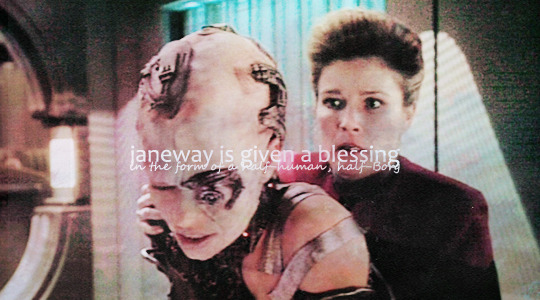
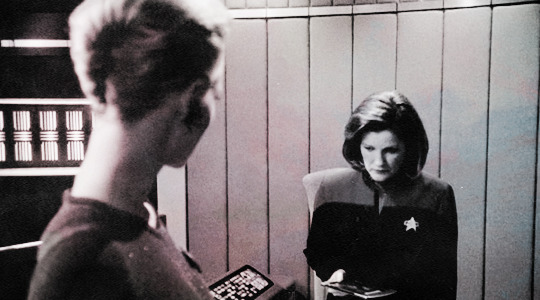
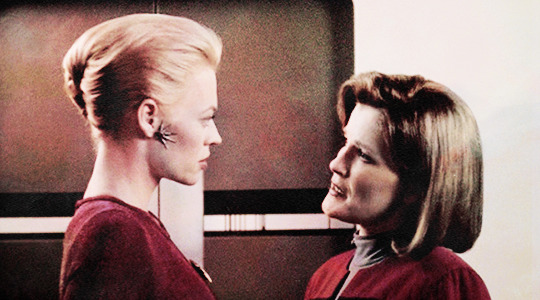
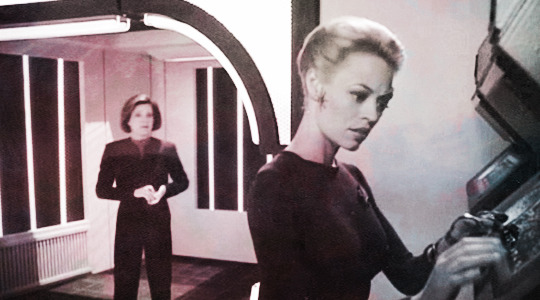
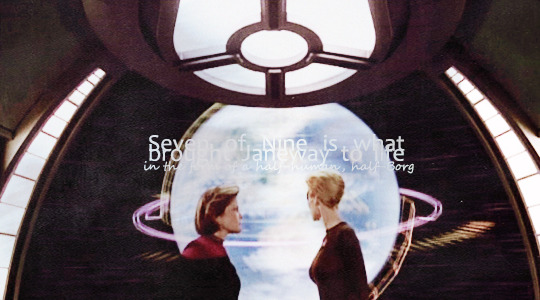
"Janeway is given a blessing in the form of a half-human, half-Borg, very beautiful girl, who we call Seven of Nine. So, I am taught vulnerability. I am taught my limitations. I am taught how small I am, in the face of this kind of possible love. Seven of Nine is what brought Janeway to life, as a deeply human woman... and I am deeply grateful for that" - KATE MULGREW
#startrekedit#wlwedit#seven of nine#jeri ryan#kate mulgrew#kathryn janeway#j7#janeway x seven#star trek voyager#bymycandyshop#otp: i'm not leaving without you
378 notes
·
View notes
Text
When Harry taunts Tom over his narrow taste in historical media, he decides to host a Barbenheimer movie night to show that he has range in both genre and era. He tries, and fails, to convince Harry to dress up as the Alan to his Ken.
In a bid to look more mature, Harry goes in an (ill-tailored) 1930s-style suit (which makes him look more childish than the Alan costume).
Neelix makes Los Alamos cocktails with grapefruit juice, lab alcohol from Sick Bay, and “just a couple special ingredients.” It is undrinkable. He dresses as “Bartender Barbie,” despite that being one of the few jobs which Barbie has never officially done.
B’Elanna dresses as Weird Barbie and spends the evening fielding odd stares and comments from crew members who “thought she’d go for more of an Oppenheimer look” and “have just never seen her so… colorful before.”
When Janeway asks Tuvok why he’s in uniform instead of a costume, he says he’s dressed for Oppenheimer, as he “was a member of a Starfleet team for the development of a new type of bomb” and that “the knowledge of [his] contribution to that work plagues [him] to this day.” There’s no record of any such work in Tuvok’s personnel file, and Janeway swears she heard a hit of irony in his voice, but she decides not to press the issue, just in case.
Janeway herself is dressed as Gloria from Barbie, with all the jackets from the travel sequence layered.
Chakotay first arrives in a suit not unlike Harry’s, although much more properly sized. This surprises most of the crew until he reveals his costume of Gloria’s unnamed husband in the break between films.
The Doctor takes advantage of the easy wardrobe changes made possible by his holographic nature, switching costumes every few minutes, distracting and frustrating the other moviegoers.
Seven decries the event as frivolous, but attends anyways, with a pink bandana worn as a wristband, at Janeway’s direction. She watches most of Oppenheimer intently, but must step out as the depiction of guilt over the creation of a weapon of mass destruction becomes unbearable.
She rejoins the group for Barbie, now wearing her bandana around her head, clearly more ready to give the idea of movie night a fair chance. Again, she’s completely immersed in the film and even tears up at the emotional scenes in which Barbie cries for the first time. Afterwards, when asked her opinion, Seven refuses to discuss either movie.
#if I can find my ipad stylus I will draw for this. leave suggestions in tags.#All subplots are merely a vehicle for posting about Seven of Nine#st: voy#st:voy#star trek#star trek: voyager#voy#voyager#star trek voyager#star trek voy#b’elanna torres#tom paris#seven of nine#seven#harry kim#janeway#kathryn janeway#captain janeway#chakotay#tuvok#neelix#barbie#oppenheimer#weird barbie#barbenheimer#fanfic#microfiction
101 notes
·
View notes
Text
I’m not leaving without you 😭Dark Frontier Seven of Nine Captain Kathryn Janeway.
#Dark Frontier #Captain Kathryn Janeway.
#Seven of Nine #Dark Frontier #J/7
#I’m not leaving without you
#seven of nine#dark frontier#kathryn janeway#j/7#janeway x seven#space wives#i’m not leaving#without you
39 notes
·
View notes
Text
Hello all 2 voyager fans
#yes rhis is based off of that eddsworld animation leave me alone my middle school obsessions are coming back#star trek#star trek voyager#voy#st voyager#star trek voy#tuvok#neelix#kathryn janeway#janeway#b'elanna torres#emergency medical hologram#emh star trek#chakotay#seven of nine#harry kim#tom paris#but theyre all in there for like one second idk#animatic#flipaclip
7 notes
·
View notes
Photo
Ships getting deep man, breaches on all decks now god dammit I love this ship
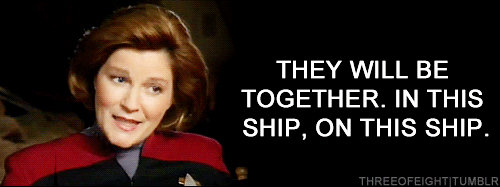
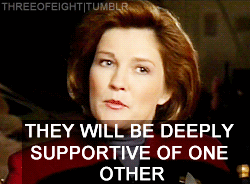
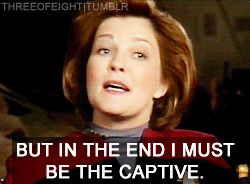
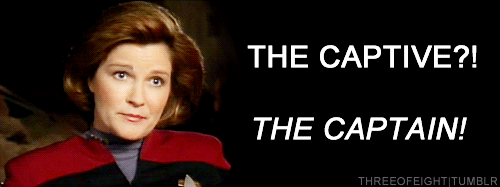
Kate Mulgrew talking about Captain Janeway and Seven of Nine in the episode “Hope and fear”.
Captive. Captive. Captive.
#janeway/seven#j/7#j7#shipping the ship so hard im unconscious now let me be its glorious down here#janeway/seven OTP#im not leaving without you#kate umm last gif we know what and WHO is on your mind
938 notes
·
View notes
Text
Thinking about this, both janeway and seven traveled back in time to save each other and that has got to be the most romantic ride or die relationship on voyager, both willing to die for each other too
#janeway/seven#j7#janeway x seven#they just make my heart swell up and explode#a little confetti hearts are everywhere#they really needed a kiss scene tbh#star trek voyager#kathryn janeway#seven of nine#otp: im not giving up on her#otp: im not leaving without you#otp: im not about to let her go#otp: voyager is my collective#shipping the ship
30 notes
·
View notes
Text
People honestly portray Tuvok as far too "rolling his eyes, reluctantly going along with Janeway's silly little shenanigans" - he's literally so serious about being right there with her on every decision she makes. Janeway's like "I'm going to stay behind if the ship blows up" and Tuvok's like "I'm staying with you." Janeway's like "I'm going to deliver every member of the Equinox crew into the jaws of death via an alien revenge massacre" and Tuvok protests a grand total of one time before being fully on the bridge assisting her. He was the only one with her when she made the decision to honor the caretaker's wishes and save the Ocampa, dooming them all. He was willing to get court marshalled in order to fulfill a wish she couldn't grant by her own hand: Get them home [no matter what happens to me] <- wherein 'me' is Tuvok. This was the same wish that spurred him forward when he had to leave her on that planet and everyone left thought him cold for trying to fulfill it without her when in his mind it was akin to a dying wish, the last thing she'd ever express to him: Get them home [no matter what happens to me.] <- wherein 'me' is Janeway. He told Seven that the golden rule to follow is that the captain is "ALWAYS RIGHT" <- (His ACTUAL words) and when Seven asks if the captain should be followed even if someone KNOWS she's wrong he says "Perhaps." This man is perhaps the most ride or die dude in the universe about Janeway. Despite her labeling him her 'moral compass' he is by NO means impartial or unbiased. He'd defend her to his last breath. He canonically makes detailed psychological observations about her and has for years. He accounts for her luck when calculating the success of certain plans. It's implied in 'Twisted' that Janeway typically listens to Tuvok's suggestions and follows them nearly without fail - to the point that he's surprised and obviously irritated when Chakotay doesn't. Despite this they've been inside one another's quarters so infrequently that Tuvok can remember each instance. They call each other "Captain" and "Mr. Tuvok" even though they've known each other for twenty years. There's something wrong with them.
#star trek voyager#TUVOK....TUVOOOOK. HEY. HEEEEY.#What the HELL did you mean by 'Remember this guideline: The Captain is Always Right.'#<- SOMETHING'S WRONG WITH HIM FR WHAT'S UP WITH HIM#Kathryn Janeway#Tuvok#WHAT are they DOOOIING <3<3#what does 'right' mean in this context since he confirms it does NOT mean 'correct' !!!!!! TUVOK!!!!! PICK UP THE PHONE!!!#the flipside to this is that Tuvok can do almost anything and Janeway's like 'continue on my dear old friend I trust you<3'#It's implied in 'Twisted' that Janeway listens to his suggestions nearly without fail and he's NOT happy that Chakotay doesn't do the same#which IS!!!!!!! INSANE!!!#Actually I'm adding this to the post.#Janeway: This man is my most trusted advisor.#Tuvok: Everything the captain says is correct at the end of the day. Even if it's wrong - no it isn't.#<- You are Chakotay and your hell has just begun#Janeway#Tuvok/Janeway#Janeway/Tuvok#what are they doiiiiing#with Spock & Kirk I know it's because they're in love with each other. What are Tuvok & Janeway DOOIIING
2K notes
·
View notes
Text
my most diabolical idea for a good ol fashioned bad ending voyager au starts from the premise that janeway wanted harry to take over as captain and the borg queen wanted seven to take over as the face of the collective and twists it so that what actually ends up happening is that harry becomes the new borg king (as the unintentional end result of some noble attempt at self-sacrifice) and seven becomes captain of voyager. cue thee craziest friends to sworn enemies with weird familial undertones dynamic ever. they’re warped reflections of each other, standing in the place the other was supposed to be, on opposite trajectories. they can’t bring themselves to kill each other but they also can’t leave each other alone. harry’s like “hey the collective’s actually a pretty great place i could keep voyager safe forever here if you would just let me” and seven’s like “i will unborg your ass if it’s the last thing i do”.
also b’elanna is seven’s first officer and she feels deeply guilty about all of this and tom has either been assimilated (possibly willingly) or is a broken shell of a human being
274 notes
·
View notes
Text
Neither of you can leave before the entire shelf/table/whatever is finished. (It can't be the easiest/tiniest furniture though. It has to be kind of complicated and/or take at least an hour.)
other versions: ds9, lower decks, tng, tos/aos/snw
490 notes
·
View notes
Text
What I’m trying to get to with all this is that Kate Mulgrew has talked about how Janeway can’t get away with what the other captains have because she’s a woman. Kirk and Picard can steal the Enterprise and commit insurrection and they’re celebrated for it. We love them for it, they break the rules and we love them for being so committed to their causes that they defy an organization they’ve sworn their lives to.
Trek captains have to break the rules to be interesting but the audience would not allow Janeway to do the same. In order for her to operate on the same level of Kirk and Picard she had to be removed from Starfleet’s reach entirely. And even then Voyager makes a point of having her study the rule book and look for precedents every time she’s up against an unusual situation.
Kate Mulgrew is very protective of Janeway as being a good role model who did the right thing as much as she could. I don’t need characters to be role models and I doubt any of you do but it’s disrespectful to Kate Mulgrew who spent seven years fighting the boys club to uphold Janeway’s good name to say she broke the rules more than anyone else when factually she broke them the least (except for time crime, though she did it so well I don’t think you can actually pin anything on the current timeline’s KJ).
It limits what Star Trek can actually do with the character. If we ever get a Star Trek Janeway show she’s not going to be running around the Alpha quadrant messing everything up like Picard did in his series and that’s kind of a bummer.
(I’m leaving Sisko out of this since I don’t remember his track record very well and I’m aware there could be some other things going on with how him being a black man influenced what he was able to do that I don’t appreciate)
904 notes
·
View notes
Text
This is how it works: your morals are unshakeable until someone you love is tied to the train track.
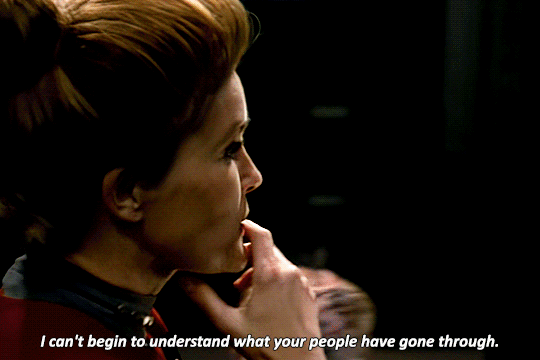
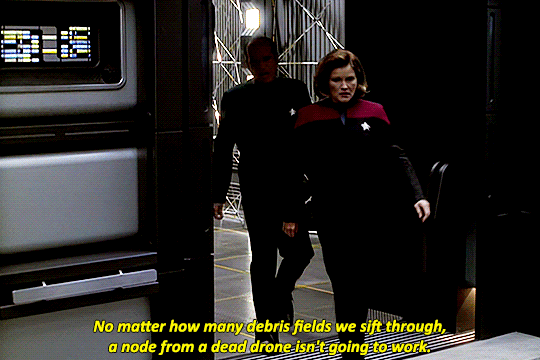
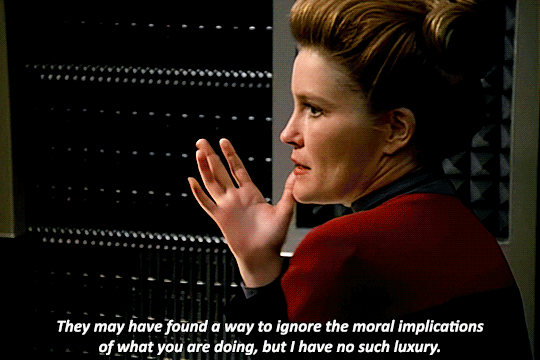
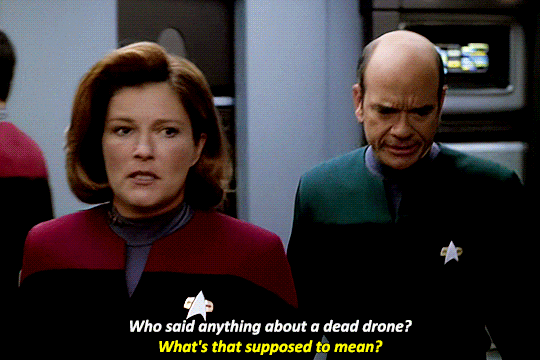
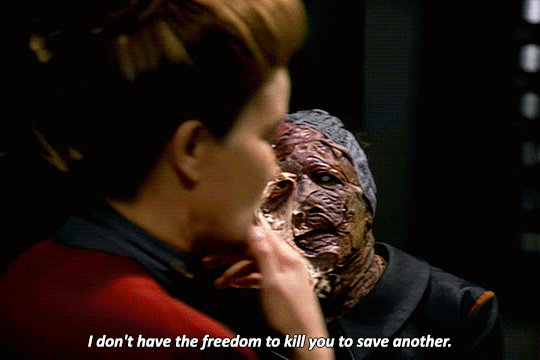
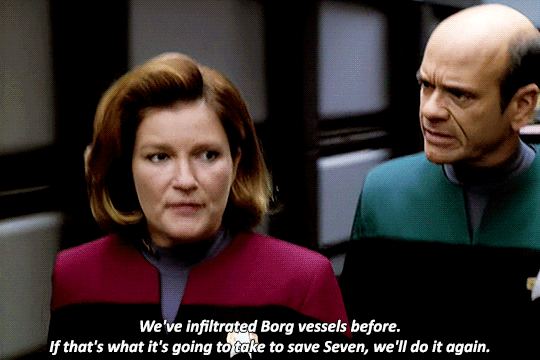
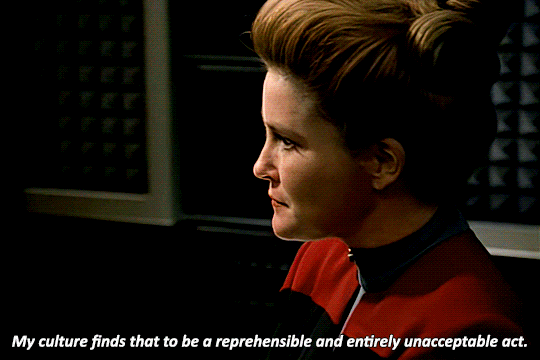
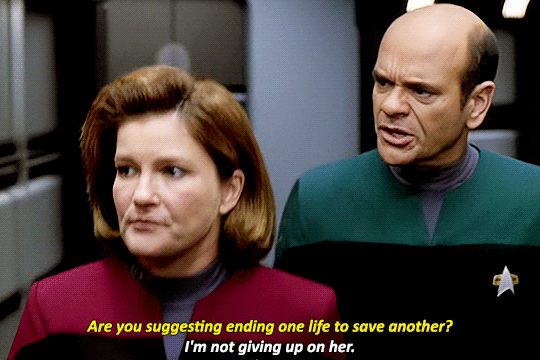
1.05/7.02
#Star Trek: Voyager#captain kathryn janeway#seven of nine#I'm not leaving you#I'm not giving up on her#I will destroy the Prime Directive to ensure she lives.
503 notes
·
View notes
Text
I’ve been thinking about disabled protagonists in Star Trek recently, which got me thinking about Seven of Nine. It’s interesting because I’m almost certain the writers of Voyager did not intend to write a disabled character, but they ended up accidentally writing one anyway, and one whose arc I find surprisingly compelling as a disabled person myself. Seven is dependent on electronic devices both inside her body and external to it in order to survive and she requires regular medical treatment and specialized adaptations to her environment in order to function. She is absolutely canonically disabled (as are all the other ex-Borg in Star Trek), even if the writers probably weren’t aware of that. The major reason that I think Seven’s arc resonates with me so much is because it reflects a deep tension between independence and dependence that is a fundamental and complex part of so many disabled people’s lives.
To be disabled is to be deeply aware at all times of your own dependence on external things (such as wheelchairs, canes, medications, etc.) and other people. At the same time, to be disabled is to also be deeply aware of the societal standards of independence and self-sufficiency you are constantly failing to live up to. You cannot do things that people are “supposed” to be able to do independently. You need help for basic tasks, and you have no choice but to trust that these external supports you are dependent on will not suddenly disappear, causing you to be unable to participate in society at all. It’s difficult to express to someone who hasn’t experienced it how much being disabled forces someone to consider their own level of dependence and independence constantly, how it becomes a deep part of one’s identity and can often be a source of trauma.
Seven’s arc on Voyager is often focused on the nature of individuality, but it is interesting how often “individuality” becomes a stand-in for independence. Seven’s disability makes her deeply dependent on the crew and resources of Voyager for survival. She could theoretically leave and use her own skills to do maintenance on her implants and install an alcove somewhere to keep herself functioning, but it would be a great risk, and her safety would be constantly in doubt. At the same time, Seven hates this dependence. She tries to rely on other people as little as possible, hating her need for the Doctor to diagnose issues with her implants and refusing to ask for help until she has no other choice. She hates this dependence because she sees it as challenging her ability to become a complete “individual” who is able to make her own autonomous choices. She hates this dependence because it forces her to rely on other people who could at any time abandon her or abuse their power over her.
So it’s far less frightening to pretend this dependence doesn’t exist, to hide it even from herself. Seven’s arrogance in her own abilities, her focus on her intellect and vast knowledge and superior physical abilities are in many ways genuine, especially early on. But at what point does this confidence in her own abilities – this reassurance that she is smart enough and strong enough to control her own destiny and be a true individual – become a coping mechanism to deal with the reality of her dependence on objects and people outside of her direct control?
Seven is told often by members of the Voyager crew that being an individual who makes her own choices and decisions is what she should strive for. And at the same time, those same people often exert control over her, attempting to restrict her autonomy. Janeway or the Doctor tell her that they know better than her what her needs are – that being an individual only goes so far. Seven’s anger at this contradiction is one of my favorite parts of her character, partially because it captures a similar feeling of anger deep inside me when I think about the ways society constantly pressures disabled people to maintain standards of independence impossible to live up to while at the same time deeply restricting our autonomy and freedom.
In the episode “Imperfection”, Seven says that what she wants most is to be useful. To be useful is to be a valuable part of society – someone who is self-sufficient and talented and certainly not deeply dependent on other people for basic survival. To be disabled is to have society constantly demand that you be useful, that you be independent and strong and never let your disabilities limit you. And at the same time, to be disabled is to discover over and over that you can never be that fully autonomous, fully functional human being seen as ideal in society. No matter what you do – no matter how far you run from the truth – it’s an impossible reality to escape.
#star trek voy#seven of nine#once i start talking about disability in star trek i cannot stop#i genuinely would love to hear other people's thoughts on this#lane posts#lane's disability meta
974 notes
·
View notes
Text
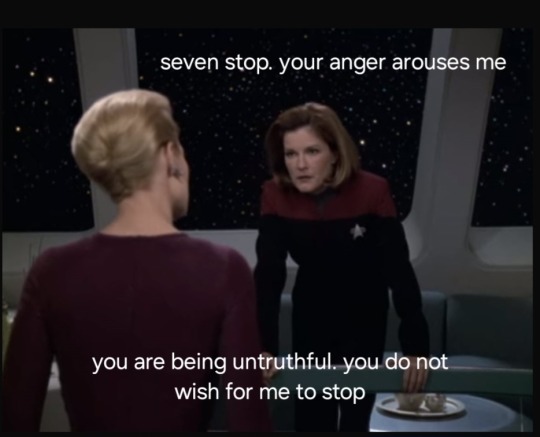
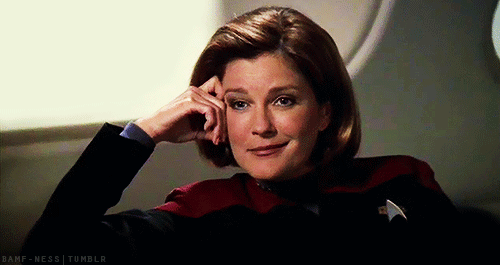
She's my firecracker, my one in a galaxy, she tells me no and I want to beg her to say yes. She's my challenger and my ally, I will never let her go.
#j/7#j7#janeway/seven#my OTP#they mean so much to me#star trek voyager#janeway x seven#seven of nine#kathryn janeway#janeway is floored#janeway is smitten#janeway is so adorably gay#look at her slow blinking and makingnheart eyes at seven 👀#otp: im not leaving without you#otp: im not about to let her go#otp: im not giving up on her#otp: i dont want you to go
26 notes
·
View notes